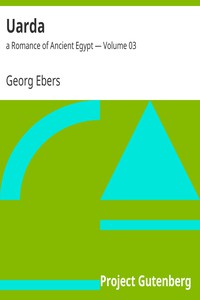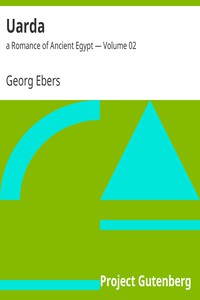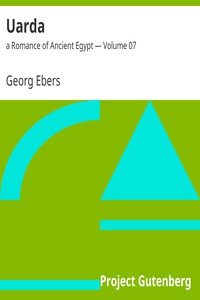Uarda : a Romance of Ancient Egypt — Volume 10 by Georg Ebers (top 10 motivational books txt) 📗

- Author: Georg Ebers
Book online «Uarda : a Romance of Ancient Egypt — Volume 10 by Georg Ebers (top 10 motivational books txt) 📗». Author Georg Ebers
Rameses met his noble opponent outside Mena's tent, and was about to offer him his hand, but the Danaid chief had sunk on his knees before him as the other princes had done.
"Regard me not as a king and a warrior," he exclaimed, "only as a suppliant father; let us conclude a peace, and permit me to take this maiden, my grandchild, home with me to my own country."
Rameses raised the old man from the ground, gave him his hand, and said kindly:
"I can only grant the half of what you ask. I, as king of Egypt, am most willing to grant you a faithful compact for a sound and lasting peace; as regards this maiden, you must treat with my children, first with my daughter Bent-Anat, one of whose ladies she is, and then with your released prisoner there, who wishes to make Uarda his wife."
"I will resign my share in the matter to my brother," said Bent-Anat, "and I only ask you, maiden, whether you are inclined to acknowledge him as your lord and master?"
Uarda bowed assent, and looked at her grandfather with an expression which he understood without any interpreter.
"I know you well," he said, turning to Rameri. "We stood face to face in the fight, and I took you prisoner as you fell stunned by a blow from my sword. You are still too rash, but that is a fault which time will amend in a youth of your heroic temper. Listen to me now, and you too, noble Pharaoh, permit me these few words; let us betroth these two, and may their union be the bond of ours, but first grant me for a year to take my long-lost child home with me that she may rejoice my old heart, and that I may hear from her lips the accents of her mother, whom you took from me. They are both young; according to the usages of our country, where both men and women ripen later than in your country, they are almost too young for the solemn tie of marriage. But one thing above all will determine you to favor my wishes; this daughter of a royal house has grown up amid the humblest surroundings; here she has no home, no family- ties. The prince has wooed her, so to speak, on the highway, but if she now comes with me he can enter the palace of kings as suitor to a princess, and the marriage feast I will provide shall be a right royal one."
"What you demand is just and wise," replied Rameses. "Take your grand- child with you as my son's betrothed bride—my future daughter. Give me your hands, my children. The delay will teach you patience, for Rameri must remain a full year from to-day in Egypt, and it will be to your profit, sweet child, for the obedience which he will learn through his training in the army will temper the nature of your future husband. You, Rameri, shall in a year from to-day—and I think you will not forget the date—find at your service a ship in the harbor of Pelusium, fitted and manned with Phoenicians, to convey you to your wedding."
"So be it!" exclaimed the old man. "And by Zeus who hears me swear—I will not withhold Xanthe's daughter from your son when he comes to claim her!"
When Rameri returned to the princes' tent he threw himself on their necks in turn, and when he found himself alone with their surly old house- steward, he snatched his wig from his head, flung it in the air, and then coaxingly stroked the worthy officer's cheeks as he set it on his head again.
CHAPTER XLVI.Uarda accompanied her grandfather and Praxilla to their tent on the farther side of the Nile, but she was to return next morning to the Egyptian camp to take leave of all her friends, and to provide for her father's internment. Nor did she delay attending to the last wishes of old Hekt, and Bent-Anat easily persuaded her father, when he learnt how greatly he had been indebted to her, to have her embalmed like a lady of rank.
Before Uarda left the Egyptian camp, Pentaur came to entreat her to afford her dying preserver Nebsecht the last happiness of seeing her once more; Uarda acceded with a blush, and the poet, who had watched all night by his friend, went forward to prepare him for her visit.
Nebsecht's burns and a severe wound on his head caused him great suffering; his cheeks glowed with fever, and the physicians told Pentaur that he probably could not live more than a few hours.
The poet laid his cool hand on his friend's brow, and spoke to him encouragingly; but Nebsecht smiled at his words with the peculiar expression of a man who knows that his end is near, and said in a low voice and with a visible effort:
"A few breaths more and here, and here, will be peace." He laid his hand on his head and on his heart.
"We all attain to peace," said Pentaur. "But perhaps only to labor more earnestly and unweariedly in the land beyond the grave. If the Gods reward any thing it is the honest struggle, the earnest seeking after truth; if any spirit can be made one with the great Soul of the world it will be yours, and if any eye may see the Godhead through the veil which here shrouds the mystery of His existence yours will have earned the privilege."
"I have pushed and pulled," sighed Nebsecht, "with all my might, and now when I thought I had caught a glimpse of the truth the heavy fist of death comes down upon me and shuts my eyes. What good will it do me to see with the eye of the Divinity or to share in his omniscience? It is not seeing, it is seeking that is delightful—so delightful that I would willingly set my life there against another life here for the sake of it." He was silent, for his strength failed, and Pentaur begged him to keep quiet, and to occupy his mind in recalling all the hours of joy which life had given him.
"They have been few," said the leech. "When my mother kissed me and gave me dates, when I could work and observe in peace, when you opened my eyes to the beautiful world of poetry—that was good!"
And you have soothed the sufferings of many men, added Pentaur, "and never caused pain to any one."
Nebsecht shook his head.
"I drove the old paraschites," he muttered, "to madness and to death."
He was silent for a long time, then he looked up eagerly and said: "But not intentionally—and not in vain! In Syria, at Megiddo I could work undisturbed; now I know what the organ is that thinks. The heart! What is the heart? A ram's heart or a man's heart, they serve the same end; they turn the wheel of animal life, they both beat quicker in terror or in joy, for we feel fear or pleasure just as animals do. But Thought, the divine power that flies to the infinite, and enables us to form and prove our opinions, has its seat here—Here in the brain, behind the brow."
He paused exhausted and overcome with pain. Pentaur thought he was wandering in his fever, and offered him a cooling drink while two physicians walked round his bed singing litanies; then, as Nebsecht raised himself in bed with renewed energy, the poet said to him:
"The fairest memory of your life must surely be that of the sweet child whose face, as you once confessed to me, first opened your soul to the sense of beauty, and whom with your own hands you snatched from death at the cost of your own life. You know Uarda has found her own relatives and is happy, and she is very grateful to her preserver, and would like to see him once more before she goes far away with her grandfather."
The sick man hesitated before he answered softly:
"Let her come—but I will look at her from a distance."
Pentaur went out and soon returned with Uarda, who remained standing with glowing cheeks and tears in her eyes at the door of the tent. The leech looked at her a long time with an imploring and tender expression, then he said:
"Accept my thanks—and be happy."
The girl would have gone up to him to take his hand, but he waved her off with his right hand enveloped in wrappings.
"Come no nearer," he said, "but stay a moment longer. You have tears in your eyes; are they for me or only for my pain?"
"For you, good noble man! my friend and my preserver!" said Uarda. "For you dear, poor Nebsecht!" The leech closed his eyes as she spoke these words with earnest feeling, but he looked up once more as she ceased speaking, and gazed at her with tender admiration; then he said softly:
"It is enough—now I can die."
Uarda left the tent, Pentaur remained with him listening to his hoarse and difficult breathing; suddenly:
Nebsecht raised himself, and said: "Farewell, my friend,—my journey is beginning, who knows whither?"
"Only not into vacancy, not to end in nothingness!" cried Pentaur warmly.
The leech shook his head. "I have been something," he said, "and being something I cannot become nothing. Nature is a good economist, and utilizes the smallest trifle; she will use me too according to her need. She brings everything to its end and purpose in obedience to some rule and measure, and will so deal with me after I am dead; there is no waste. Each thing results in being that which it is its function to become; our wish or will is not asked—my head! when the pain is in my head I cannot think—if only I could prove—could prove——"
The last words were less and less audible, his breath was choked, and in a few seconds Pentaur with deep regret closed his eyes.
Pentaur, as he quitted the tent where the dead man lay, met the high- priest Ameni, who had gone to seek him by his friend's bed-side, and they returned together to gaze on the dead. Ameni, with much emotion, put up a few earnest prayers for the salvation of his soul, and then requested Pentaur to follow him without delay to his tent. On the way he prepared the poet, with the polite delicacy which was peculiar to him, for a meeting which might be more painful than joyful to him, and must in any case bring him many hours of anxiety and agitation.
The judges in Thebes, who had been compelled to sentence the lady Setchem, as the mother of a traitor, to banishment to the mines had, without any demand on her part, granted leave to the noble and most respectable matron to go under an escort of guards to meet the king on his return into Egypt, in order to petition for mercy for herself, but not, as it was expressly added—for Paaker; and she had set out, but with the secret resolution to obtain the king's grace not for herself but for her son.
[Agatharchides, in Diodorus III. 12, says that in many cases not only the criminal but his relations also were condemned to labor in the mines. In the convention signed between Rameses and the Cheta king it is expressly provided that the deserter restored to Egypt shall go unpunished, that no injury shall be done "to his house, his wife or his children, nor shall his mother be put to death."]
Ameni had already left Thebes for the north when this sentence was pronounced, or he would have reversed it by declaring the true origin of Paaker; for after he had given up his participation in the Regent's conspiracy, he no longer had any motive for keeping old Hekt's secret.
Setchem's journey was lengthened by a storm which wrecked the ship in which she was descending the Nile,





Comments (0)